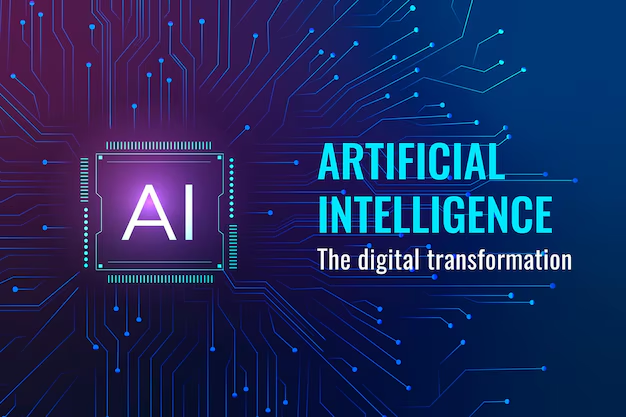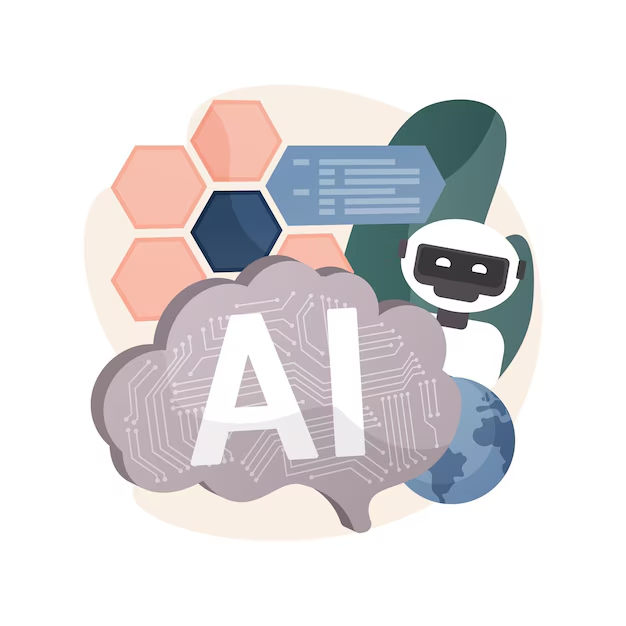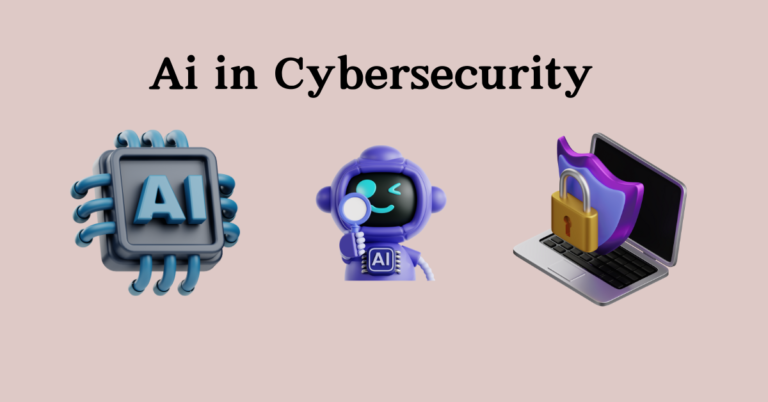AI is the development of computer systems that are capable of performing tasks that were thought to require human intelligence. AI is currently one of the most innovative technologies in the market that changes industries, enhances people’s lives, and generates new possibilities in most fields.

The Basics of AI
In its simplest terms, AI is the ability of machines to receive inputs, analyze them, and make outputs in a given context. These systems employ high-level algorithms, huge data sets, and deep-learning models, which imitate human thinking. AI based on ML and DL, allows AI to learn from experiences, and as a result, enhance its performance over time.
Types of Artificial Intelligence
AI is categorized into four major types.

Reactive Machines
These systems can act on certain rules to accomplish a particular task. For instance, IBM developed Deep Blue, an AI capable of playing chess by using a set of pre-programmed moves, without the ability to remember previous games
Limited Memory AI
This particular AI learns from previous data to make present decisions. For instance, in self-driving cars, the AI employed is a limited memory AI where it makes use of data from previous driving experience. Developers apply tools like TensorFlow and Keras to create models used for learning and decision-making.
Theory of Mind AI
Currently in the development process, this AI will be capable of recognizing emotions and beliefs. It intends to mimic human emotional quotient an important aspect of Artificial Intelligence in sectors such as health and learning.
Self-aware AI
This type which has not yet been evolved will have its own consciousness and awareness. Even though it is theoretical, the research is still being conducted in order to create self-aware AI.
How AI Works
There are a number of tools and technologies that support AI to analyze and make decision based on the given data. These include:
Machine Learning
There are two categories of AI systems; the reactive and the self-learning and these can be trained using machine learning algorithms. Some of the tools that can be used in training the models include; Scikit-learn, PyTorch, and Azure Machine Learning.
Deep Learning
Deep learning consist of a neural network with a large number of layers to model the complex relationships. TensorFlow and PyTorch are two of the most important libraries that are used in the creation of deep learning models which are used in today’s AI applications such as speech recognition, autonomous vehicles among others.
Natural Language Processing (NLP)
NLP is a branch of artificial intelligence that helps the machines to process natural language, analyze it, and produce the output in the form of human language. SpaCy or Google Cloud Natural Language are tools that are used for NLP applications for instance chatbots or language translation.
Use of AI and the Instruments Associated with Them
It has impacted most sectors and is still coming up with more ideas. Here are some of the most prominent applications of AI and the tools that power them:
Healthcare
AI in Medical Imaging
AI is used in diagnosing medical images, such as X-rays, MRIs, and CT scans, to identify cancerous tissues. Some examples of these tools include the IBM Watson Health and Google DeepMind that aid in the analysis of these medical images with a view of making the diagnosis faster and accurate.
AI in Drug Discovery
Researchers use AI in drug development to predict how various chemicals will interact with each other. Atomwise and BenevolentAI are technologies that the pharmaceutical firms employ for accelerating drug identification and creation.
AI-Powered Healthcare Assistants
AI virtual assistants assist doctors and patients with scheduling appointments, diagnosing conditions, and following up on care. Some of the most known software that help to optimize healthcare processes are Nuance’s Dragon Medical and Ada Health.
Finance
AI in Fraud Detection
The financial industry uses AI to prevent fraud by identifying patterns in transactions and detecting anomalous activities. Palantir and Darktrace are AI applications in banking and finance for stopping fraud and maintaining security.
AI for Algorithmic Trading
AI in trading, for instance, employs analysis to determine the best time to transact business. These include Kavout and Alpaca which use machine learning algorithms to come up with informed decisions in trading.
Manufacturing
AI-Powered Robots
The use of AI robots includes carrying out activities like assembling, packaging, and checking the quality of the manufactured products. Some of the tools used in Robotics include Rethink Robotics and KUKA AI which are used in manufacturing hence improving efficiency.
Predictive Maintenance
AI uses real-time monitoring to determine the health status of machines, thus knowing when the machines require servicing to avoid a breakdown. Uptake and SparkCognition are examples of AI-based software mostly utilized in the manufacturing industries for predictive maintenance.
Customer Service
AI-Powered Chatbots
They apply NLP to decode the message of the customer and respond to his or her query. There are other tools such as LivePerson and Zendesk AI that assist companies in managing their customer services and be able to offer service round the clock.
Sentiment Analysis
One way to determine customer perception is by using artificial intelligence to analyze customer comments. Lexalytics and MonkeyLearn are tools that help in determining the customers’ feelings and enhancing services based on their feedback.
Education
Personalized Learning
AI generate unique learning paths that are suitable to the student’s performance as well as their learning preference. Knewton and Coursera are examples of companies that employs the use of Artificial Intelligence in delivering education.
Automated Grading
AI can also grade essays and assignments, freeing up teachers’ time. Gradescope for example applies the use of artificial intelligence in the assessment of student written assignments and gives feedback to the students.
Retail
AI in Recommendation Systems
Online marketplaces like Amazon implement technological advancements such as AI to recommend products to buy, and Netflix uses it to suggest content to watch. Amazon Personalize and Adobe Sensei are two AI systems that leverage the data about users’ behavior to provide them with recommendations.
Inventory Management
AI helps in that it is able to anticipate the consumption and manage inventory on its own. ClearMetal and Zebra Technologies are some of the tools that most retailers use to ensure they manage their stock well.
Autonomous Vehicles
Self-driving Technology
AI technologies enable self-driving car to drive on the road, avoid any obstacles, and make decisions on the road. OpenAI’s Gym, NVIDIA Drive and Aptiv are some of the tools that firms such as Tesla use to develop self-driving car systems.
AI in Traffic Management
Technological advancement especially the use of Artificial Intelligence enables cities to control traffic flow to avoid congestion and plan the best routes. Google’s Waze and INRIX provide Artificial Intelligence traffic solutions to manage the traffic.
Career Opportunities in AI
The applications of AI are increasing and, therefore, present several opportunities for employment. Here are some popular roles in AI, along with the tools they use:
AI Engineer
Creates reusable models and algorithms with the help of Machine Learning libraries, including TensorFlow, PyTorch, and AWS Machine Learning.
Machine Learning Engineer
Concentrates on developing and enhancing the machine learning models via tools such as Scikit-learn, Google Cloud AI and Microsoft Azure AI.
Data Scientist
Analyzing large datasets with the help of tools like Jupyter Notebooks, Tableau and through programming with Pandas.
Robotics Engineer
Specializes in creating and implementing AI based robotic systems with ROS and OpenCV for image processing in robotics.
AI Ethicist
Analyzing the data privacy, bias and ethical issues in AI systems thereby ensuring the proper use of AI.
Challenges and ethical issue in the use of AI
AI brings tremendous benefits but also presents significant challenges.
Bias and Fairness
If the dataset contains bias, it biases the model’s results as well. Frameworks such as AI Fairness 360 and Fairlearn assist the developers to identify and rectify the bias in their AI solution.
Data Privacy
AI systems require large amounts of data, which raises significant concerns about individual privacy. Thanks to the approaches like Differential Privacy, AI systems can learn from the data without violating privacy.
Job Displacement
With the increase in the application of AI in different fields, there is the fear of job loss. This is where governments and organizations are turning to, for instance, retraining programs to reduce this effect.
The Future of AI
It will be interesting to see how the future of AI will look like. We can anticipate that AI developments in healthcare, transportation, and education will transform society in the future. However, we must not forget the ethical aspects of artificial intelligence to ensure it benefits everyone.
In sectors such as cognitive computing/quantum AI companies are extending the frontiers of what can be done with AI. Companies like IBM Watson and Google Quantum AI develop some of the most famous technologies in these sophisticated AI branches, creating the foundation for new and more effective solutions.
To learn more about what is artificial intelligence







1 thought on “What is Artificial Intelligence?”